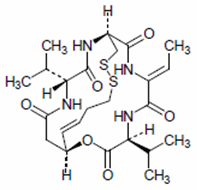DTP Branches and Offices
Romidepsin (Istodax®, FR228 and FR901228)

Romidepsin, (depsipeptide, NSC 630176), was first isolated from Chromobacterium voilaceum by Fujisawa Pharmaceutical Company and identified by the company in a screen for agents that can reverse the ras transformed phenotype. Based on its structural novelty and interesting pattern in human tumor cell line assays, the NCI Decision Network Committee (DNC) accepted NSC 630176 for early-stage evaluation in1991. Development of the drug by Fujisawa was stopped after cardiotoxicity was observed in dogs following IV administration daily for 2 weeks or twice weekly for 4 weeks. The NCI DNC approved further evaluation to determine whether the cardiotoxicity could be overcome through modification of the administration schedule. Subsequent studies showed that intermittent (q4d × 3) treatment was better tolerated than daily dosing in dogs and mice. Toxicity in general, and cardiotoxicity specifically, appeared to be related to the rate of drug administration: a 4-hour infusion was better tolerated than a 30-second bolus or 10-minute injection. The maximum tolerated dose (MTD) in dogs was 1.0 mg/kg (20 mg/m2) q4d× 3 administered over 4 hours. A starting dose of 2 mg/m2 (1/10 MTD in dogs) given as a 4-hour infusion was recommended for phase 1 clinical trials. In addition to reducing the cardiac risk, DTP resources and expertise contributed to the development of analytical methods and a unique lyophilized powdered clinical formulation. A Clinical Trial Agreement was negotiated between NCI and Fujisawa. The IND was approved in 1996 and phase 1 trials were conducted by the NCI intramural program and Georgetown Lombardi Cancer Center. After activity was observed in patients with T-cell lymphoma treated at the NCI clinical center, a phase 2 trial was designed and opened there. Intensive cardiac monitoring was incorporated in this trial which demonstrated no evidence of myocardial damage, but some evidence of QTc prolongation. This was subsequently noted in almost all histone deacetylase (HDAC) inhibitors. Marketing approval of romidepsin was granted in 2009. NCI is still conducting trials under the IND and working with Celgene, which acquired the compound from Gloucester Pharmaceuticals.





